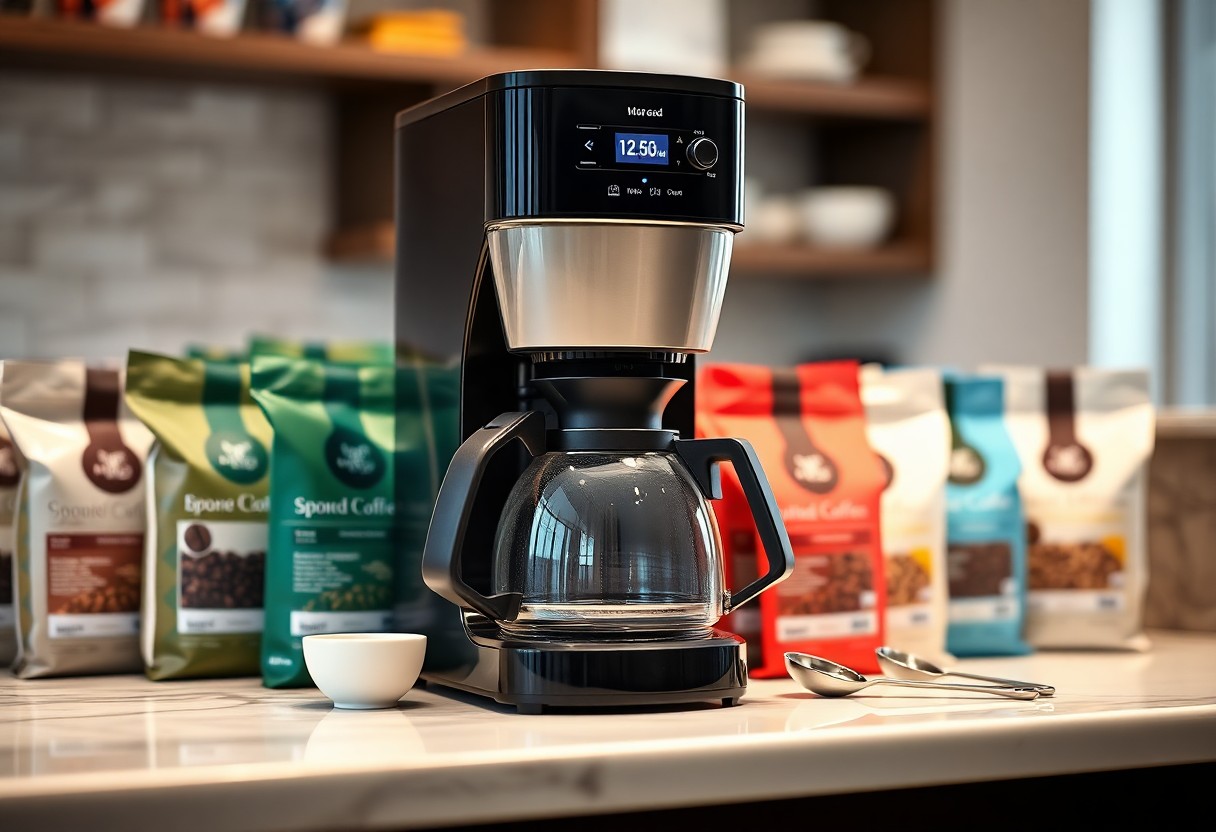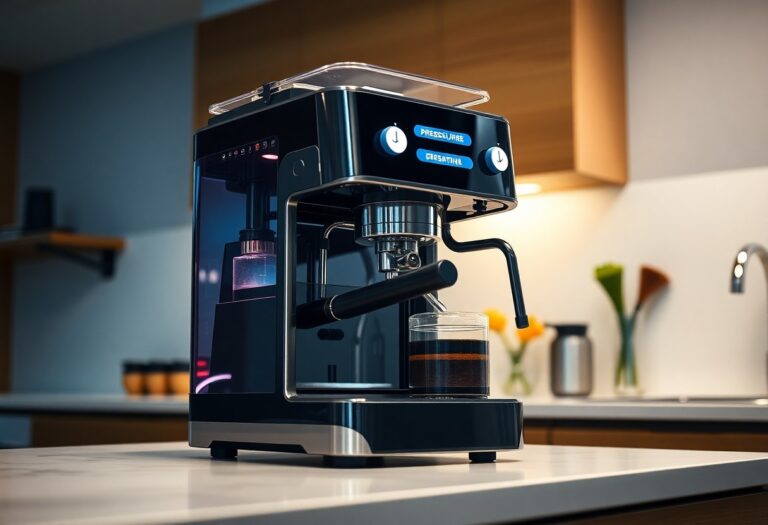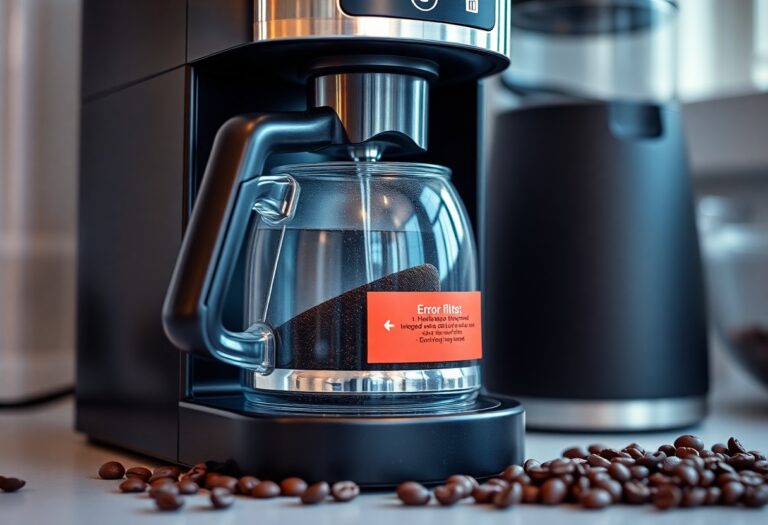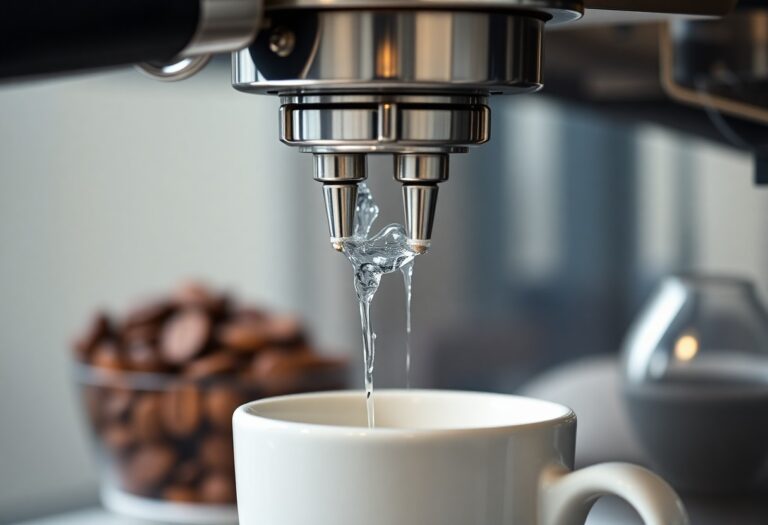What is a Good Coffee Machine – Quality Features Guide
This guide will help you determine what constitutes a good coffee machine tailored to your needs. With so many options available, it’s necessary to consider quality features that enhance your brewing experience. You’ll explore aspects like brewing capacity, ease of use, and maintenance requirements, ensuring that your investment delivers delicious coffee every time. By understanding what makes a coffee machine truly exceptional, you can savor every sip and elevate your morning routine.
Key Takeaways:
- Look for machines with customizable brewing options to cater to different coffee preferences and styles.
- Evaluate the quality of the materials used in construction, as durable components contribute to better performance and longevity.
- Consider the ease of cleaning and maintenance, as well as the availability of parts for repairs or replacements.
- Check for advanced features like programmability, built-in grinders, and temperature control for enhanced brewing precision.
- Assess the machine’s capacity, ensuring it meets your consumption needs without compromising on the quality of the brew.
Craftsmanship of Brew: The Importance of Build Quality
The performance and longevity of your coffee machine are intimately tied to its build quality. A well-constructed machine not only enhances your brewing experience but ensures consistent results with every cup. Machines built from durable materials often resist wear and tear, keeping them operational over the years. High-quality components contribute to better temperature regulation, reduced noise levels, and overall efficiency, making them a worthy investment for your daily coffee rituals.
Material Matters: Choosing Stainless Steel vs. Plastic
Choosing between stainless steel and plastic can significantly impact your coffee machine’s lifespan and performance. Stainless steel is not only more resistant to heat but also less prone to scratches and discoloration. On the other hand, plastic models tend to be lighter and often more affordable but may not offer the same durability and aesthetic appeal. For long-term use and a cleaner brewing experience, stainless steel is often the more reliable choice.
Durability and Warranty: Investing in Longevity
A robust warranty reflects the manufacturer’s confidence in their product’s durability. Opting for a coffee machine with an extended warranty can protect your investment. Many reputable brands offer warranties ranging from one to five years, covering parts and labor. These warranties can save you significant costs in repairs over time, whereas cheaper models may lead to unexpected expenses and frustrations if they break down prematurely. Choosing well can lead to years of brewing satisfaction.
When considering warranties, pay attention to what they actually cover. Some brands provide comprehensive coverage, including electrical components, pumps, and heating elements, while others may have more limited policies. A machine that comes with a five-year warranty not only assures quality but demonstrates a manufacturer’s commitment to their product. Investing in a well-constructed machine with a solid warranty means you’re less likely to face costly repairs, enabling you to enjoy your coffee without the headaches.
The Heart of the Matter: Understanding Brewing Mechanisms
At the core of every great cup of coffee lies the brewing mechanism, which determines how flavor compounds are extracted from coffee grounds. Different machines employ various technologies, each impacting taste, aroma, and strength. Whether opting for a simple drip coffee maker or a high-end espresso machine, understanding these methods is important for elevating your coffee experience. For more insights, check out Everything You Need to Know About Buying a Coffee Maker.
Drip vs. Espresso: Choosing Your Preferred Method
Drip coffee makers extract flavors through a slower brewing process that allows hot water to permeate coffee grounds, resulting in a smooth taste ideal for everyday consumption. In contrast, espresso machines use rapid bursts of high-pressure water to extract rich, concentrated flavors in a short time, perfect for those who enjoy intense, bold shots. Your choice between these brewing styles will depend on your flavor preferences and brewing habits.
The Role of Pressure and Temperature in Extraction
Pressure and temperature play significant roles in the coffee brewing process. For espresso, a pressure of at least 9 bars is necessary to force water quickly through finely ground coffee, producing a complex profile of flavors. Meanwhile, drip coffee typically uses water heated between 195°F to 205°F, allowing for a gentle extraction that balances acidity and sweetness. Understanding how these variables affect extraction can greatly improve your brewing techniques.
| Brewing Method | Pressure and Temperature |
| Drip Coffee | 195°F to 205°F; 1 bar |
| Espresso | 190°F to 202°F; 9 bars |
Adjusting both pressure and temperature can fine-tune your brewing results. For instance, lowering the temperature for espresso can bring out sweetness but might compromise extraction efficiency, while increasing the pressure can heighten flavors but may lead to over-extraction, creating a bitter taste. Understanding these relationships allows you to customize your brewing preferences for the ultimate coffee experience.
| Variable | Flavor Impact |
| High Temperature | Bitter flavors may emerge from over-extraction. |
| Low Temperature | Under-extraction can lead to sour or weak taste. |
| High Pressure | Enhanced richness and complexity in the flavor profile. |
| Low Pressure | Weaker flavors, less body in the brew. |

Features That Matter: Identifying Essential Functionalities
Choosing a coffee machine that meets your needs requires understanding the features that truly enhance your brewing experience. Look for functionalities that not only elevate the taste of your coffee but also simplify your daily routine. From the capacity of your machine to how customizable your brew can be, each feature plays a part in crafting your perfect cup. Identifying these key elements ensures you invest in a machine that serves you well over time.
Programmable Settings: Convenience at Your Fingertips
With programmable settings, you unlock a world of convenience that allows you to have your coffee ready precisely when you want it. This feature enables you to set brewing times, customize strength and temperature, and even choose specific recipes from your smartphone app on supported models. An intuitive interface can make navigating these settings a breeze, giving you more time to enjoy your coffee. This enhances your overall coffee experience.
- Ease of use makes your morning routine smoother.
- Customization options tailor your brew to your taste.
- Remote control through apps adds a tech-savvy edge.
Maintenance Features: Cleaning and Descaling Made Easy
Having maintenance features integrated into your coffee machine can transform your brewing experience. Machines equipped with self-cleaning functions significantly reduce the time you spend on upkeep, ensuring that your coffee tastes fresh daily. Descaling alerts are another useful aspect that notifies you when it’s time to remove mineral buildup, prolonging your machine’s lifespan. Features like removable drip trays and dishwasher-safe components make routine maintenance straightforward and hassle-free. This way, you can enjoy a consistently great cup of coffee without the burden of tedious cleaning tasks.

Taste Test: Evaluating Flavor Profiles and Consistency
A well-performing coffee machine does more than just brew; it extracts the rich flavor profile of your beans. When evaluating different machines, conduct a taste test to assess both the flavor and the consistency of your coffee. Look for a machine that consistently delivers a balanced cup, where no singular flavor overpowers the others—think bright acidity paired with deep sweetness and a smooth finish. Variability in brewing can lead to inconsistent results, so choose a model known for maintaining uniformity in temperature and brew time for the best outcomes.
Grind Size Control: The Power of Precision
Having control over grind size can significantly enhance your coffee experience. Machines that allow you to adjust grind settings tailor the extraction process, unlocking different flavor profiles. Fine grinds are ideal for espresso, while coarser grinds work better for methods like French press. The ability to fine-tune this aspect ensures your coffee reflects your personal taste, creating a more satisfying drinking experience.
Water Quality Impact: The Often-Overlooked Factor
Water quality plays an imperative role in brewing café-quality coffee. Subpar water can lead to bitterness and off-flavors, overshadowing the nuances of your carefully selected beans. Using filtered or bottled water can drastically improve the taste of your brew, as contaminants and minerals found in tap water often interfere with flavor extraction.
The source of your water is not just a trivial consideration; it’s a fundamental element of the brewing process. Studies show that water comprises over 98% of coffee, meaning its mineral content can significantly influence taste. For example, water with a balanced mineral profile enhances caffeine extraction and overall flavor without introducing undesirable tastes. Aim for water that is free from chlorine or high levels of sulfur, as these can impart unpleasant flavors. A dedicated water filtration system or even mineral additives can elevate your home brewing to barista levels, ensuring that your coffee tastes its absolute best.
Making Sense of Pricing: What’s Worth the Investment?
The price of coffee machines can vary significantly, but understanding what you’re paying for is crucial. While $100 machines may serve basic needs, investing in a higher-quality model can drastically improve your coffee experience. Features such as temperature control, grind settings, and brew strength can justify a higher price tag. Analyzing what you value most in your coffee experience will guide your purchasing decision, ensuring that every dollar spent contributes positively to your daily brew.
Analyzing Cost vs. Feature Set: What’s Justifiable?
Determining the value of a coffee machine hinges on the balance between cost and feature set. Basic machines may lack crucial features like programmable settings and precision controls, leading to inconsistencies. On the other hand, investing in machines that offer customizable brew strengths or built-in grinders can enhance your overall coffee quality. As you weigh your options, consider how often you drink coffee, how important flavor consistency is to you, and whether you’d benefit from advanced brewing technologies.
The Value of Specialty Brands: Are They Worth It?
Specialty coffee brands often come with premium price tags, but exploring whether they deliver an added value is worthwhile. Brands like Breville or Technivorm are often praised for their meticulous engineering, consistent performance, and longevity, making them a sound investment for dedicated coffee enthusiasts. You might find that the superior build quality and enhanced functionalities lead to a better brewing experience, which in turn allows you to enjoy café-quality coffee in the comfort of your home.
Opting for a specialty brand can mean more than just a higher price; it often translates to tailored features and superior materials that enhance user experience. For example, Breville’s espresso machines come equipped with precise temperature control and innovative pressure systems, ensuring optimal extraction. In contrast, standard brands might compromise on these elements, leading to a less satisfying brew. If you prioritize quality and consistency in your coffee routine, investing in a specialty brand could prove beneficial in both flavor enhancement and overall satisfaction.
Conclusion
As a reminder, selecting a good coffee machine involves understanding the vital quality features that can enhance your brewing experience. By considering factors such as brewing methods, ease of use, maintenance, and additional functionalities, you can make an informed decision that aligns with your coffee preferences. Investing time to evaluate these aspects ensures that your chosen machine will not only meet your needs but also elevate your daily coffee ritual. Enjoy the process of finding the perfect coffee companion that suits your lifestyle!
FAQ
Q: What are the primary features to look for in a good coffee machine?
A: When choosing a good coffee machine, it’s important to consider several key features: brewing method (drip, espresso, French press, etc.), capacity (how much coffee it can make at one time), programmable settings (for convenience), ease of cleaning, and build quality (materials used). Additionally, features like a built-in grinder, warming plates, and customizable brew strength can enhance your coffee experience.
Q: How does the brewing method affect the taste of the coffee?
A: The brewing method significantly impacts the flavor profile of the coffee. For instance, espresso machines use pressure to extract oils and flavors quickly, resulting in a bold and rich taste. Drip coffee makers generally produce a cleaner and milder flavor, ideal for those who prefer a lighter brew. Understanding the differences in brewing methods helps in choosing a machine that aligns with your taste preferences.
Q: Is it worth investing in a more expensive coffee machine?
A: Generally, higher-priced coffee machines come equipped with better materials, advanced features, and improved reliability. Investing in a more expensive machine might yield better consistency in coffee quality, durability over time, and added conveniences such as programmable settings and advanced brewing options. However, it ultimately depends on your personal coffee-drinking habits and preferences.
Q: What maintenance is required for coffee machines?
A: Maintenance varies by machine type but usually includes regular cleaning of components like the brew basket, carafe, and water reservoir. For espresso machines, regular descaling to remove mineral buildup is recommended, as well as cleaning the portafilter and steam wand. Always refer to the manufacturer’s guidelines for specific cleaning and maintenance instructions to ensure longevity and optimal performance.
Q: Can specialty features, like smart technology, improve my coffee experience?
A: Specialty features such as smart technology can enhance your coffee-making routine significantly. Machines that integrate with smartphone apps allow you to control brewing times, customize recipes, and receive notifications. These features can make your experience more convenient and tailored to your preferences, especially if you lead a busy lifestyle.







